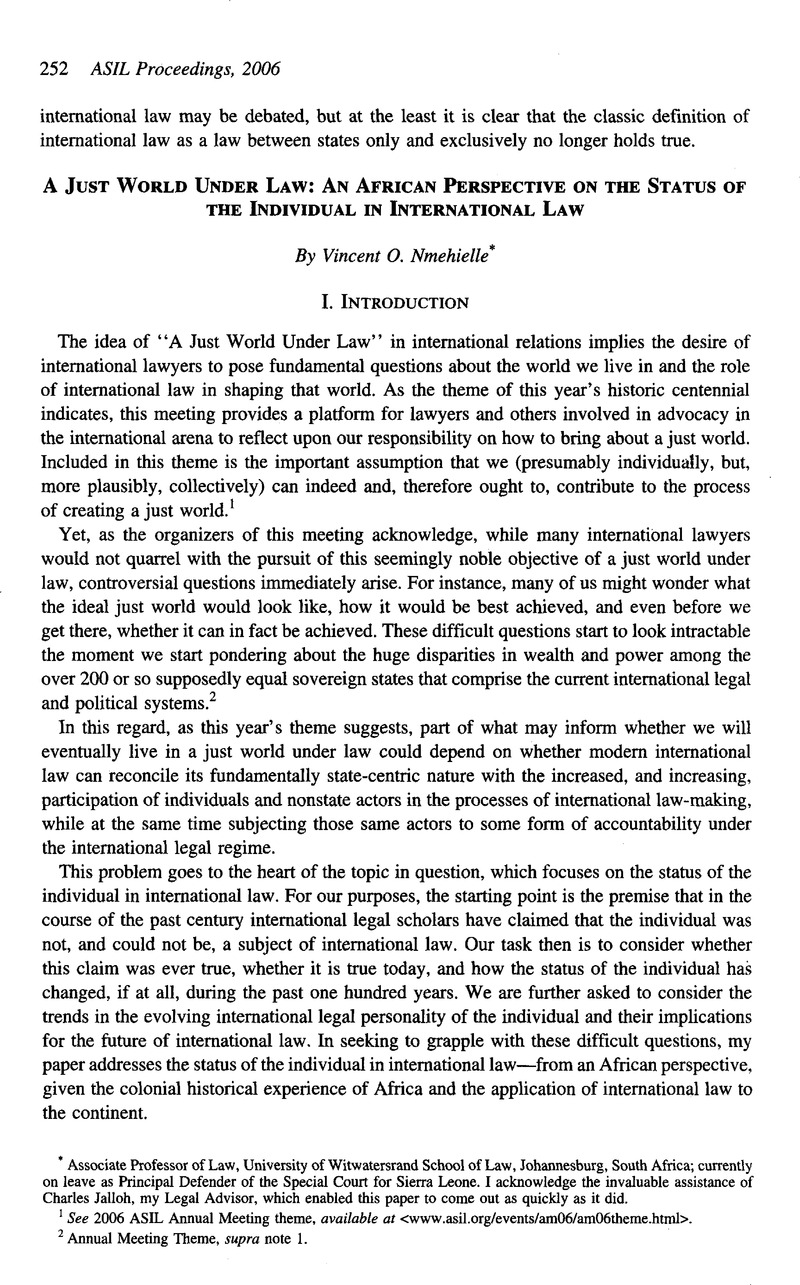Published online by Cambridge University Press: 28 February 2017

1 See 2006 ASIL Annual Meeting theme, available at <www.ASIL.org/events/am06/am06theme.html>.
2 Annual Meeting Theme, supra note 1.
3 Rebecca M. M. Wallace, International Law 56-88 (2002).
4 Henkin, Louis, International Law: Politics, Values and Functions in 216 Collected Courses of the Hague Academy of International Law 13, vol. IV, 208 (1989)Google Scholar.
5 Id.
6 Id.
7 ld.
8 Henkin, supra note 4, at 208.
9 Id.
10 Id.
11 Id.
12 Id.
13 Much effort has been made to write the colonial experience of the Third World into international law. For a comprehensive compilation of leading publications, see Mutua, Makau & Anghie, Antony, What is Twail?, 94 ASIL Proc. 33 (2000)Google Scholar.
14 According to Anghie, Antony, Finding the Peripheries: Sovereignty and Colonialism in Nineteenth Century International Law, 40 Harv. Int’l L. J. 1, 5 (1999)Google Scholar.
15 For another example, see Hersch Lauterpacht, International Law and Human Rights 61 (1950).
16 Nmehielle, Vincent O. The African Peer Review Mechanism Under the African Union and its Initiative: The New Partnership for Africa’s Development, 98 ASIL Proc. 240 (2004)Google Scholar.
17 Id. at 298 (citing Leopoldo Lovelace Jr., Has International Law Failed Africa?, available at <http://www.isanet. org/archive/lovelace.html>).
18 Mutua, Makau Wa, Why Redraw the Map of Africa: A Moral and Legal Inquiry, 16 Mich. J. Int’l L. 1113, 1122 (1995)Google Scholar.
19 According to Anghie, a “central feature of positivism was the distinction it made between civilized and uncivilized societies,” from which flowed the “claim that international law was the exclusive province of civilized societies.” See Anghie, supra note 14 at 25, for more on the linkages between positivism and colonialism.
20 Anghie, supra note 14.
21 Id. at 3.
22 Id. at 24.
23 Mutua, supra note 18, at 1137.
24 Id. at 1138.
25 Id.
26 1001 UNTS 45, entered into force June 20, 1974.
27 June 27, 1981, entered into force Oct. 21, 1986 (1982), 21 ILM 58.
28 Constitutive Act of the African Union, adopted at the Thirty Sixth Ordinary Session of the Assembly of Heads of State and Government of the OAU, July 11, 2000, at Lome, Togo. See Decisions on the Establishment of the African Union and the Pan African Parliament, OAU Doc. AHG/Dec. 143 (XXXVI).
29 See, for example, Oloka-Onyango, J., Beyond the Rhetoric: Reinvigorating the Struggle for Economic and Social Rights in Africa, 26 Cal. W. Int’l L. J. 51 (1995)Google Scholar; Odinkalu, C.A., Analysis of Paralysis or Paralysis by Analysis? Implementing Economic, Social, and Cultural Rights Under the African Charter on Human and Peoples’ Rights, 23 Hum. Rts. Q. 327 (2001)CrossRefGoogle Scholar.